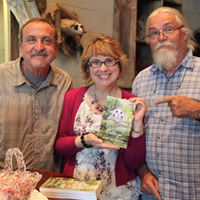
Pirate Mike is not my target reader. He is just a generous friend who stopped in at one of my book signings. May you be so blessed.
On today’s Writer Wednesday, I’m talking about audience.
If you don’t want anyone to read your work, you probably aren’t ready to be an author. Keep on being a writer, though, tucking your poetry and prose away inside a journal. I have notebooks full of things I wrote in the early years, and I’m probably leaving a note for those to be burned at my death. They don’t need an audience. (If you are writing journals to hand down to your children, they are your audience. Good work!)
Most of us write because we have something to say. And, we hope someone is listening. Here are some tips for figuring out the someones.
Before you write, imagine your reader in great detail. If you are writing Science Fiction with a high fantasy element, you probably don’t imagine your grandmother and her friends sipping tea and reading your story in rocking chairs. Yet, those are exactly the women I imagine reading my Glory Circle Sisters series.
Question: Where does your reader sit when he reads?
Create an ideal reader. Think about the gender, age, interests, and deep needs of this reader. You can even give the reader a name and physical traits. Cut a picture out of a magazine and post it over your computer if that helps. I keep a file of notes I’ve received from readers. Their comments remind me I’m creating characters and stories to relate to the needs of specific people. I keep a few of those actual readers in mind as I write.
Question: What does your reader do on Sunday afternoon?
Recognize your limitations. Never submit a book proposal to an agent or editor and say, “People of all ages and genders will love this.” No, they won’t. You will have some crossover readers, of course. But, you will have a more narrow target audience, such as 9-12 year old boys who long for adventure and want to know their lives matter. That could have been the original target audience for the Harry Potter books, even though people of all ages and genders did end up loving them. If Rowlings had written to all us muggles, rather than to the peers of Harry, the books wouldn’t have worked as well.
Question: What scares your reader? (You don’t have to write thrillers for this question to matter. In a love story, the answer is often “being alone.”
Remember that readers are real. The buzz word in publishing these days is “platform.” That is simply the reach you have as a writer. Your social media presence, speaking engagements, and other places you can sell books. Every writer needs a platform of some kind if they intend to be published and read. But, it is easy to move into a user mentality when you feel this pressure to build. Eventually, people can just become planks in your platform. One way to avoid that is to be closely connected to real people who read your books. Friends, family members, co-workers, the neighbor down the street. Every time you write something, picture a real person who might read it.
Question: How will your Aunt Tillie, your boss, your son’s soccer coach, or your hairdresser feel when they read this work?
We will talk in another post about how to find these readers and connect to them. For now, start to write with readers in mind. I suspect it will change a few things for you. It did for me.
